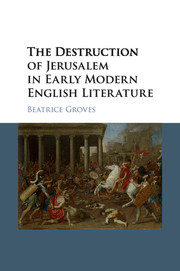Book contents
- The Destruction of Jerusalem in Early Modern English Literature
- The Destruction of Jerusalem in Early Modern English Literature
- Copyright page
- Dedication
- Contents
- Figures
- Book part
- Introduction
- Part I The destruction of Jerusalem in early modern literary culture
- Part II The destruction of Jerusalem in early modern texts
- Conclusion
- Bibliography
- Index
- References
Bibliography
Published online by Cambridge University Press: 05 October 2015
- The Destruction of Jerusalem in Early Modern English Literature
- The Destruction of Jerusalem in Early Modern English Literature
- Copyright page
- Dedication
- Contents
- Figures
- Book part
- Introduction
- Part I The destruction of Jerusalem in early modern literary culture
- Part II The destruction of Jerusalem in early modern texts
- Conclusion
- Bibliography
- Index
- References
- Type
- Chapter
- Information
- The Destruction of Jerusalem in Early Modern English Literature , pp. 232 - 261Publisher: Cambridge University PressPrint publication year: 2015



